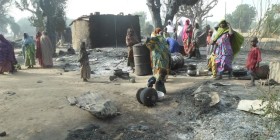The heavily armed militants stormed the girl’s dormitory in the middle of the night, herding more than 100 students on to vehicles and burning down nearby buildings as they made their escape.
That was a week ago Monday.
Of the 129 students abducted from the Government Girls Secondary School from the Nigerian town of Chibok, 77 are still missing.
No one knows where they are. And surprising still, no one’s particularly shocked.
“All the community are sympathizing with the parents,” principal Asabe Kwambura told CNN. But, she said, “the people in the villages are not surprised.”
Such is life in the lawless Borno province.
Tucked away near the border with Cameroon, with phone services cut off and travel strongly discouraged, this poor corner of Nigeria is no stranger to such brazen, violent acts.
For 11 months, the provinces of Borno, Yobe and Adamawa have been under a state of emergency due to relentless assaults blamed on the Boko Haram.
The Islamist militant group has bombed churches and mosques; kidnapped women and children; and assassinated politicians and religious leaders.
Boko Haram — whose name means “Western education is sin” in the local Hausa language — says it wants to impose a stricter enforcement of Sharia law across Africa’s most populous nation.
The group has gone about its misguided mission with such depressing regularity that residents have become somewhat numb.
Where’s the president?
Nigerians marvel that U.S. President Barack Obama traveled to Massachusetts after the Boston Marathon bombings that killed three people last year.
Boko Haram-related violence killed 1,500 in the first three months of this year alone. And yet, Nigerian President Goodluck Jonathan has not visited the region recently.
Part of it may have to do with geographic divisions.
Jonathan is from the predominantly Christian south. That’s not just geographically distant but also culturally different from the Muslim-dominated, violence-wracked north.
To put things in perspective, none of Jonathan’s major political rivals from the north attended his inauguration in 2011. And widespread violence broke out in the north when his presidential win was announced, with some residents claiming the election was rigged.
It’s the opposite of what happened with Jonathan’s predecessor.
The previous president, Umaru Yar’Adua, was from the north. During his tenure, violence ravaged the country’s oil-rich, southern Niger Delta, with militant groups saying they wanted a fairer distribution of the region’s oil wealth.
Where’s the military?
The Nigerian military has been engaged in a brutal, ever-escalating fight with Boko Haram. Rights group accuse both sides of ruthlessness — Boko Haram of indiscriminate attacks, and the military of extrajudicial killings.
But when it comes to the abductions of girls — and there have been many — the military has had a difficult time.
Last week, the defense ministry erroneously reported that all but eight of the girls from the latest kidnapping were free. It retracted a day later.
Lawan Zanna, the father of one of the students, said the government turned from using “blatant propaganda” to making a “blatant lie.”
Part of the reason the military is loathe to respond mightily maybe because the girls who are kidnapped are raped, forced into servitude — but rarely killed.
In February, 29 college students in the northern Yobe province were killed after an attack authorities blamed on Boko Haram. All of them were males. The women were spared.
In other instances, kidnapped girls were later rescued while working on farms. Many were pregnant or had babies — the result of rape.
The spate of kidnappings began in May 2013 when Boko Haram leader Abubakar Shekau announced in a video that this was part of its latest bloody campaign. The kidnappings, he said, were retaliation for Nigerian security forces nabbing the wives and children of group members.
Those kidnapped, he said, would begin a new life as a “servant.”
But the latest incident has ratcheted up the pressure on the military.
The military said “ongoing frantic efforts” of security forces, vigilante groups and hunters are attempting to find and free the students.
But a week later, the fate of 77 girls remain unknown.






Leave a reply